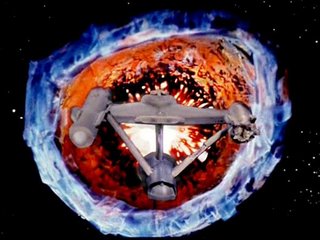
In the argument over whether or not it's a good idea to upgrade the original series effects, "The Doomsday Machine" is one episode that quickly comes up as a reason for such an upgrade.
And I'll give you that upgrading some of the model shots and battles between the
Enterprise, the
Constellation and the titular Doomsday Machine might, I say might visually make this more pleasing.
But if you're only watching "The Doomsday Machine" for the effects, you're really missing the entire point of the episode.
What we've got here in Moby Dick in space. Replace Captain Ahab with Commodore Matt Decker and the whale with a huge, planet killing machine that has to be stopped before it destroys most of the colonized heart of the Fedearation and you've got "The Doomsday Machine." And while the effects are questionable at times, they are not the heart and soul of this story. What is the heart and soul is the characters and the conflicts.
William Windom turns in one of the best guest-star turns not only of the original series but
Star T rek
rek as a whole. His Commodore Matt Decker is a good man pushed too far. Decker's entire crew is killed by the Doomsday Machine when his ship is crippled. Decker, thinking he's saving their lives has them beamed down to a planet that the Doomsday Machine promptly destroys. Decker's guilt and horror at this sends him over the edge, into obsession and almost crippling depression. We watch Decker go from a man who can barely put into words the horror of what he saw to calm and assured, taking command of the
Enterprise in the heat of battle when Spock won't do what he wants. Windom delivers a performance for the ages and his acting elevates the crew around him to new heights. Say what you will about Shatner's acting, the man can do it when he wants to--and it shows here. It will also show in another episode that I'll discuss in the coming days.
"The Doomsday Machine" is an episode where we examine the consequences of command. Decker loses his sanity and then his life to the planet killer. But unlike other contemporaries of Kirk who went mad with power, Decker hasn't followed that path. He's made the same decisions Kirk or any other commander would only to have them blow up in his face in unexpected ways. He's a tragic figure and when he dies in the third act, we really do feel a moment of regret and sadness for him.
"The Doomsday Machine" also emphasizes the insular nature of the
Enterprise crew and their loyalty to Kirk. Spock is forced by regulations to give up command even though he knows Decker shouldn't be anywhere near the center seat. McCoy tries to help but can't produce the documentary evidence that Decker is suffering from a mental trauma. In the end, Kirk forces the issue when he orders Spock to take command of the Enterprise on his (Kirk's) personal authority. Forget your killer space battles, the scene that unfolds as Decker states he doesn't recognize Spock's authority to relieve him is as tense and real as any battle unfolding on the vast backdrop of space.
This episode is enhanced by a terrific musical score by Sol Kaplan. It's easy to forget how effective this music is since a lot of it got recycled time and again in lots of space battle after this one. But here with the cues timed precisely with what is unfolding on screen, the music enhances and already great episode of
Star Trek.I suppose I'd be remiss is not pointing out the obvious technical errors. Most of these are due to the scale of ships in the story. Many will point out that the shuttle craft and the
Constellation are the same size as they're seen entering the Doomsday Machine. It's a huge mistake and one that I'm sure will be corrected when we get the new edition whenever it airs. That said, I couldn't care less about it. The effects are not what drives this story. It's the solid story, the well defined characters and the superlative muscical score that make "The Doomsday Machine" one of the best outings not only of the original series but of all of
Star Trek.Labels: Star Trek
posted by Michael Hickerson at 9/06/2006 07:55:00 AM |
|